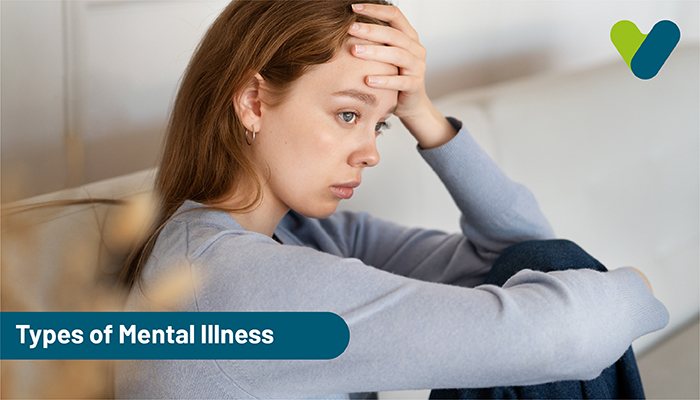In today’s day and age, there is increased emphasis on mental healthcare. It is now becoming common knowledge that taking care of your mental well-being is as important as taking care of your physical health. To that end, you can rely on mental health professionals such as counsellors, therapists, psychologists, and psychiatrists. Such specialists can use their knowledge and expertise to assess your symptoms and issues and diagnose your condition appropriately. However, prior to reaching out to a professional, you might want to have an idea of the kind of mental disorder you might be dealing with. Such information can help alleviate distress and help you narrow down on the mental health professional that would be suitable for you.
What Is A Mental Health Disorder?
Before delving into the different types of mental disorders, it is essential to understand the meaning of the term. A mental disorder is a condition that is characterised by a clinically substantial disturbance in a person’s emotional regulation, cognition, or behaviour. Such mental health disorders are usually associated with distress of some kind as well as impairment in areas that are significant to functioning.What Are The Types of Mental Disorder?
To help you address mental health issues, here are the different types of psychological disorders you should know about:- Anxiety Disorders: One of the first mental illnesses that most people seem to be familiar with is anxiety. Anxiety disorders are conditions that are earmarked by excessive fear and worry along with resultant behavioural disturbances. If you have an anxiety disorder, symptoms can get severe enough to result in distress or disturbance in regular functioning. A few of the more commonly experienced anxiety disorders are characterised by excessive worrying, panic disorder wherein an individual panics often, social anxiety disorder wherein an individual worries excessively about social situations, and so on.
- Depression: While it is common for most individuals to experience mood fluctuations or reactions to external situations, depression is significantly different. A depressive episode is characterised by a depressed mood comprising sadness, emptiness, and irritability. A person might also find themselves losing interest in pleasurable activities for a period of at least two weeks. You might also experience other symptoms such as poor concentration, excess guilt, or low self-worth, sleep disturbances, hopelessness, change in appetite, suicidal thoughts, and so on.
- Bipolar Disorder: Although mood swings are a common human experience, those experienced under bipolar disorder are distinct. Individuals with bipolar disorders experience depressive episodes that alternate with periods of mania. While a depressive episode is characterised by feelings of sadness and/or emptiness, loss of pleasure in activities, and other depressive symptoms, manic symptoms include feelings of euphoria, irritability, amped up energy, excessive talking, lack of sleep, boost in self-esteem and so on.
- Post-Traumatic Stress Disorder: Post-Traumatic Stress Disorder, or PTSD, is a mental illness that may develop after an individual has been exposed to experiences that are extremely threatening or horrific. A few of the hallmarks of PTSD are experiencing flashbacks of the traumatic event in the present, avoiding thoughts and memories associated with the event, persisting perceptions of a current threat. Again, these symptoms may last for several weeks and cause significant functional impairment.
- Schizophrenia: Schizophrenia is a mental illness that causes significant impairments in an individual’s perceptions and behaviour. Symptoms associated with schizophrenia include persisting delusions, hallucinations, disorganised thinking and behaviour, agitation, and so on. Additionally, individuals suffering from schizophrenia might also experience difficulties with cognitive functioning. And although schizophrenia has an impact of life expectancy, it can be treated and managed via medication and other measures. While experiencing such mental illness types can be challenging and leave one feeling isolated and often stigmatised, there are treatment options available that can help alleviate and manage symptoms. If you or anyone you know is dealing with mental health challenges, reach out to experts for help.

